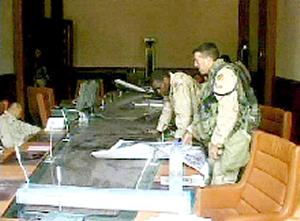On another vital front, British troops thrust deep into Basra, Iraq's second largest city, with a sense they are finally shaking loose the Saddam Hussein loyalists who have hung on for more than two weeks. But in northern Iraq, U.S. aircraft mistakenly bombed a convoy of allied Kurdish fighters operating with U.S. special forces in a battle at a crossroads south of Irbil. At least 17 Kurdish fighters died, said Hoshyar Zebari, a senior member of the governing Kurdistan Democratic Party. He said that among the 45 wounded was a brother of the party's leader. A convoy of Russian diplomats, including the ambassador, came under fire Sunday while evacuating Baghdad, the Russian foreign ministry said. A correspondent for state-run Russian television said the convoy was caught in a crossfire and three diplomats were hurt, one with a serious stomach wound. U.S. Central Command said no allied forces were operating in the area at the time, but it was investigating what happened. In chalking up military gains, the United States accelerated a campaign of persuasion, too. The chief goals: to get Republican Guard troops to give up and to stop Syrian assistance to Saddam's forces. Gen. Peter Pace, vice chairman of the Joint Chiefs of Staff, said the United States would welcome Republican Guard division commanders and troops in a postwar government, if they surrendered now. "I mean, there's a small clique around Saddam Hussein who are the perpetrators of all the crimes against humanity," Pace said on ABC's "This Week." "Below them are still many senior leaders and troops who have their free will to decide what their life is going to be like. They can surrender and become part of the future free Iraq, or they can fight and die." Deputy Defense Secretary Paul Wolfowitz, a hard-liner in the Bush administration, said intelligence sources suggest Syria has continued to help Iraq's defenders despite U.S. warnings to cease. Asked on "Fox News Sunday" whether Syrian officials realize they are courting bigger trouble with the United States, Wolfowitz said, "I hope they understand it. "It's a strange regime, you know, it's pretty brutal in itself. I don't know what game they're playing, but they need to stop." In and around Baghdad, the intensified ground fighting was taking a toll on civilians. At the al-Kindi hospital in a working-class Baghdad district, scores of civilians with shrapnel wounds have been coming in since Saturday night. Among them were eight members of one family. In one ward, several children wore bloodstained casts on their legs and arms, and some had difficulty breathing. One girl had bandages over half her face. Tasting a breakthrough in southern Iraq, British forces rolled into Basra in a column of 40 armored personnel carriers, their deepest push against Saddam loyalists in the city. "Their days are limited," said Brigadier Graham Binns, commander of the Desert Rats. "Our intelligence tells us that morale is low among the defenders of the city, that the population can't wait to see us, and the opposition such as it is, is uncoordinated." Central Command officials estimated Sunday that 2,000 to 3,000 Iraqi fighters died in the 3rd Infantry Division's 25-mile incursion in an industrial section of Baghdad a day earlier. Brig. Gen. Vincent Brooks gave no specifics on how the estimate was reached. More than three dozen tanks and armored vehicles staged the raid; U.S. casualties were described as light. More such forays were likely. "It's important to do so to secure the area; it's also important that we do that for psychological reasons," said command spokesman Jim Wilkinson. "Frankly we've had to prove to the civilians in the north and the south that we're there to stay. Once they know we're there to stay, they celebrate." Iraqi state television broadcast a statement attributed to Saddam, urging soldiers who had been separated from regular units to join up with any unit they could locate. Capitalizing on their dominance of the skies, U.S. commanders began deploying planes over Baghdad 24 hours a day, ready to direct strike aircraft to ground targets. Along the Tigris River, 20 miles southeast of Baghdad, Marines of the 3rd Battalion, 7th Marines, overran the headquarters of the Republican Guard's Second Corps, seized one of Saddam's numerous palaces and destroyed what U.S. intelligence reports suggested was a terrorist training camp. The nighttime attack was mounted in the town of Salman Pak, which military officials said contained a suspected weapons of mass destruction site dating back to 1991. Allies have yet to find Iraqi weapons of mass destruction; accusations that they exist provided the chief justification for invading the country. Wolfowitz said Iraqi authorities have probably rounded up people who know where the weapons are. "In fact, most of those people are probably collected in places where they're intimidated and terrorized," he said. Allied forces sifted Sunday through the rubble of the Basra home of Ali Hassan al-Majid, the Iraqi general known as Chemical Ali for ordering a poison gas attack against Kurds in 1988. Allied officials said the general was believed to have been home when it was attacked Saturday but they did not know whether he was killed. |
